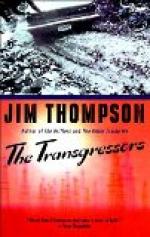“I shall make it a point to have the chairman call upon you for an address,” he assures Trueman at parting.
For three days the sessions of the conference are devoted to partisan discourses. There seems to be no hope of reaching middle ground. The newspapers ridicule the utterances of the speakers as the vaporings of demagogues. And they are little else.
On the fourth day, true to his promise, Professor Talbot gets the chairman to call upon Trueman for a fifteen-minute speech.
From his first words Trueman wins the attention of the audience. His voice is full and far-reaching; his language simple, and it is possible for every one to grasp his meaning instantly. He chooses to win the delegates to his way of reasoning by force of the truth he utters rather than by appealing to their senses by a display of forensic and oratorical ability.
In the few minutes allotted to him, he reviews the industrial conditions of a decade and shows where the insidious principle of class legislation has undermined the prosperity of the people to bestow it upon the few. In an unanswerable argument he pleads for the restoration of the rights of the majority; by a rapid review of the causes that have led to the downfall of the nations of the past, he shows that the unjust distribution of the fruits of labor must inevitably lead to the disintegration of the state.
His peroration is a fervent appeal to the delegates to reaffirm the equality of man; it calls upon them to adopt resolutions advocating the government control of all avenues of transportation and communication, and for the strict regulation of all industries that affect the common necessities of life.
“There is no law above that of the Creator. He did not fashion some of his children to be damned with the brand of perpetual servitude; He did not anoint some with omnipotence to place them as rulers over the many. When He made mankind in His image, it was to have them live in fraternal relationship. There should be no competition for the mere right to live. Until God’s design is declared to be wrong, I shall never cease to counsel my brothers to live true to the Divine principles of liberty, equality and fraternity.”
With these words he closes his address.
There is no means for measuring the exact effect of his words. The plaudits of an audience are an uncertain criterion.
In the final vote that is taken, after three other delegates have spoken, a resolution is adopted calling for the appointment of a standing committee of three to continue the investigation of the Trust question until another year.
This result is not satisfactory to the radicals, yet they make no open objection. To Trueman it is a source of gratification to know that the heretical proposals of some of the delegates have been voted down.
The conference is on the point of closing when Delegate William Nevins moves that the chairman of the special committee be empowered to increase the number of the committee to forty at his own discretion. This motion is adopted.




